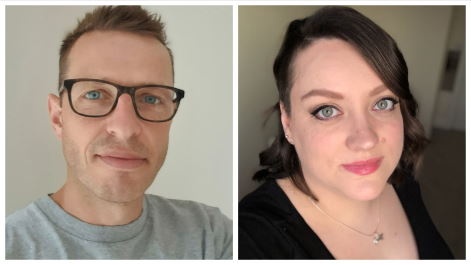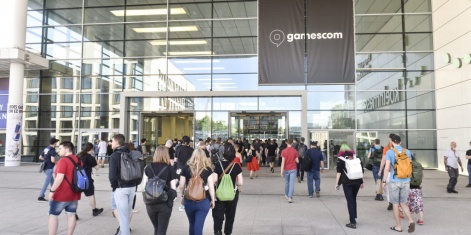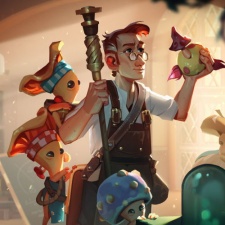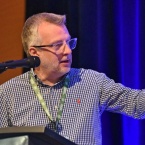Publisher Marvelous recently celebrated its tenth anniversary in Europe. The company is a wholly-owned subsidiary of Marvelous Inc, Japanese developer of the Story Of Seasons (originally branded in the west as Harvest Moon) and Rune Factory series.
The team has grown recently and is refocusing its vision, so at Gamescom last month PCGamesInsider.biz took the opportunity to interview the European leaders about their strategy.
Marvelous Europe is now actively signing indie projects to release, the first being Hungary-developed Mandragora for release in 2023 with more PC titles planned, such as The Last Alchemist (pictured above). It's also extending its incubator, mentorship and brand partnerships initiatives.
We sat down with Marc Melton (managing director) and Sarah Burns (head of production and operations) on the busy trade show floor to talk about the company’s vision. “We have a lot of autonomy to make a difference in Europe, and that’s a real luxury compared to other companies,” explains Melton, speaking of the relationship with HQ in Japan.

Both have a background in the broader entertainment industry, moving into games publishing after many years of work in film and TV. Melton has been at Marvelous for three years, after a stint at Konami, and Burns for two years after spells at Jagex, Miniclip and Numskull.
PCGamesInsider.biz: Can you talk a little bit about the refocusing of the business now – what you’re changing and why?
Marc Melton: We have an idea of the company that we wanted to work for. We have to balance the commercial imperatives of making money and taking risks with different brands and games.
Marvelous’s identity had an appeal to a certain audience. I took a bit of a jump for Marvelous, and then a couple of people joined us as key hires. And we worked on our values. The reason is, that there are so many publishers launching every week. Why would people choose to work with us?
We have to balance the commercial imperatives of making money and taking risks with different brands and gamesMarc Melton, Marvelous
Our focus is on being human with each other. We’re a small team. We’re collaborative. Why would developers work with us? Because of our approach. A publisher should be trying to commercialise the creative vision of a developer and to be a good partner.
That’s not revolutionary, but we wanted to be ambitious and collaborative and human. And that’s meant that we’ve been able to attract partners like Primal or Mandagora or Vile Monarch for The Last Alchemist and also our new titles.
It’s also given us an opportunity to support other incubators and accelerators. Because we’re all passionate. If you work with other companies – sometimes the bigger ones – you can end up feeling like you’re going backwards. You’re getting de-skilled.
We’re trying to get everyone to be involved in mentoring or coaching. We’re lucky. We get our home-grown fan titles, and we don’t have to get a pipeline of content through that maybe other companies have to because of their shareholders. At the moment, we have a very different approach. I hope developers come to us and stay with us because they’re engaged. Those values underpin it.
That’s been the journey of the company so far, and it’s been done in three years. We’ve had a lot of changes in that time with personnel and approach and titles.
Can you speak a little more about those values?
Sarah Burns: Our values actually came from our staff. We interviewed everyone. We said, “How is it working at Marvelous? How do you feel? What is the environment like? What do you get from it?”
We had three core values from that. Firstly: we’re human. We are real people at the end of the day, and we’ve got to work together and look after each other, but also work with developers and bring that human approach to say, “We’ll work with you, and with what your needs are.”
Is this appropriate for our market? We want to be more inclusive. We want to add more diversity to our titlesSarah Burns, Marvelous
The second one was collaboration. We work very closely together. We want to make the best games that we can – especially with our home-grown titles. Our Japanese developers look to the West to see, culturalisation-wise, what’s appropriate. We have a hand at looking at early documents in our game design and saying, “Is this appropriate for our market? This is where we want to be. We want to be more inclusive. We want to add more diversity to our titles.” I get a lot of value, personally, from being able to have feedback on those titles.
And our third one was ambition. We are a smaller publisher compared to the big boys, but we all try to punch above our weight. We’re all very ambitious, and we want to be leading the publishing market.
So what does being ambitious look like for you?
Marc Melton: I know lots of entrepreneurs say it’s three to five years of hard work, and then people think you have an overnight success! I’ve been told off for saying this, but we’re working at the sexiest unsexy company. As a publisher, we have a responsibility to our partners and employees. So “ambitious” for us means: having a foundation. “Boutique publisher” was used about us, which I quite like. So I think “ambitious” for us is to prove who we are. “Ambitious” for us is when people say, “I haven’t heard from Marvelous for a while. Didn’t they do the ‘booby ninja games’? Oh, actually, they do quite a lot.”
It’s just repositioning Marvelous. Because we want to be part of the conversation that takes place. We’re looking forward. We have a really strong team, well-balanced. We are about 12, 13 people. There are big companies that are over 250 people just stuffing games into their content pipeline! We’re in a really good place, and we’re quite pragmatic, and I think we have good relationships with the developers we’re working with.
Above: The announcement trailer for Marvelous's new PC roguelite Ninja Or Die.
How did your work with the GameBCN incubator come about?
Marc Melton: We had to start somewhere. We positioned ourselves as a company that believes in putting something back in, rather than just saying, “Hey, we’re a publisher. We’ve got a bag of cash. Fancy doing a game?”
We also need to learn a lot more about that space. GameBCN has a good programme. It's quite formal. They’ve been running for years. So it was a good way of starting to understand young developers and how we can add value.
We enjoyed that. We then actually started iGi [Indie Game Incubator], which is our Marvelous-led initiative in Japan. It’s not culturally acceptable there to take the money at seed level. So people just sit in their garage for a long time, eating crisps, just trying to get a game out, because they’re like, “I’m not taking money.”
The industry is very male-oriented. But Marvelous is 70 percent female. Which is just unheard ofSarah Burns, Marvelous
So by understanding, culturally and internationally, how it works and applying our knowledge of that part of the world and in Europe, we have been part of the solution rather than the problem.
Sarah Burns: I’ve personally been involved for two years now and Marc for three. We like to support the incubator and offer our Marvelous team as mentors. I mentor from a production point of view, and Marc from a business point of view. We have Ellie Ball, who helps with the marketing, and John Bond does it as well.
We offer marketing support, production support, and business support to new, young, up-and-coming indie teams. We try to support them in what areas we think they need help. There’s a pretty rounded set of skills we can offer them. So we sit down with them from the beginning, mentor them every month, and check in with them. We have Q&As so they can ask us anything.
It’s not guaranteed there’s a publishing deal, but they do get put in front of a lot of different publishers, and often a lot of them do come out with publishing deals by the end of it. They find that they’re in a really good place. They come to the end, and they have a demo day, and it’s really great to see where they've come from and where they’ve gone. It’s fantastic to see we’ve helped shepherd them in production disciplines as well. And we have really lasting relationships with these teams.
Is it true you’ve got a brand partnership with Scotland’s Royal Zoological Society?
Marc Melton: We’ve done a couple of things. We sponsored a Gayming Award last year, supporting inclusivity and authenticity. We’re not just sponsoring stuff for the sake of it. We believe in it.
It’s this human reputation we’re trying to back up. You’ve got to live it a little bit. The decisions we make are shared by our values. What can we do to help? I personally have a lot of anxiety and insecurity if we’re making things like packaged products.
We wanted to do something professionally relevant that complemented the stories we’re trying to shareMarc Melton, Marvelous
Can we do something? We’re still just 12 people trying to make a business; however, what really resonated with [our game Story Of Seasons] was that insects like the pine hoverfly are just unloved. People go, “Can’t we have a cuddly panda?” With a fly, some people are like, “Who cares?”
But, of course, if you look at insects and biodiversity – they’re part of it! Helping them is our first toe in the water. Looking back on that, we all did feel quite good about it. We wanted to do something professionally relevant that complemented the stories we’re trying to share. And there are lots of exciting things happening. But the pine hoverfly aspect was the first thing we could do here in Europe.
You mention inclusivity and diversity. The games industry historically can be a toxic place, the working environment and crunch. What are you doing to make the gaming workplace better?
Marc Melton: One thing we’ve been working on, on the inclusivity side, is a few of us are part of the Tentacle Zone. So we’re trying to mentor under-represented recruits. A lot of people are working very hard, and pushing against some very difficult boundaries.
Sarah Burns: The industry is very male-oriented. It’s very, very male-heavy. But, actually, Marvelous is 70 percent female. Which is just unheard of in a company in this industry. We all have a huge emotional intelligence, and we all try to look after each other. We have initiatives in-house for women and marginalised groups within Marvelous who meet up once a month for that.
Keira is a mental health worker. She worked with Safe In Our World. She’s been bringing in some great initiatives to the company as well. It’s really key in our minds that we have a healthy environment and flexible working. We’re all basically remote, still, but we still get together quite frequently to celebrate our wins.

Are you seeing the market hunger for a certain type of game? What about the metaverse and NFTs and web3 buzzwords. Are you steering clear of all that, or do you have a strategy for that space as well?
Marc Melton: The conversations we’ve had so far are based on teams. We’re working with people to build relationships. If those sort of discussions come up as part of those relationships, then we’ll have a conversation! But ultimately we want to work with people where we get them, and they get us. We’re not prescripting MMOs, the metaverse, or anything. But the fact is, we want to work with good people making stuff that is entertaining. It’s that “sexiest unsexy company”. We think differently but I don’t know if we’re reinventing anything.
Sarah Burns: I agree wholeheartedly. We’re looking for great games that resonate with us, and have the right message, and are fun to play.
















